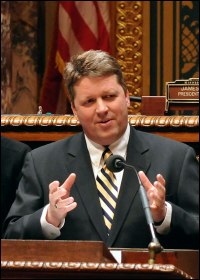No, Thank You.
I recently held a town meeting in a small town on the Western side of my Senate district. As the town meeting turned its focus to the budget crisis, one gentleman stood up claiming to have all of the answers regarding Minnesota’s budget woes. He said he had a proposal for “solving the state’s budget deficit without raising taxes.” I said I was interested in his “list” and he said he would be sure to send it to me. Sure enough, a few days ago I received a document outlining what some of those cuts might look like. Here is a small sampling of some of what Minnesota could expect (and I quote):
• Eliminate intrusive and ineffective home visiting and mental health screening programs
• Eliminate Early Childhood Professional Development
• Eliminate Kindergarten Readiness Assessment and Intervention Programs
• Eliminate Preschool screening and ECFE (Early Childhood Family Education)
• Eliminate Early Childhood Literacy
• Eliminate After School Community Learning Grants
• Repeal the public school staff development mandate
• Reduce the number of MNSCU campuses
• Require the DNR to fully self-fund via fees
• Eliminate Local Government Aid
• Reduce Court appropriations and increase attorney’s annual license
• Reduce Human Rights Department funding
• Provide Health Insurance subsidies, not Health care services and payments
No thank you. If this list is a solution, count me out. The cuts to early childhood education alone would set this state back 30 years creating a host of problems for years to come. We need to reaffirm the connection between intelligent investments and the public benefits we receive in return. We are a state of community minded people who care about our children, our neighbors, the elderly, and the poor. We value these public assets and most of us are more than willing to pay for them.
The document to which I refer comes from the Minnesota Budget Solutions Coalition which includes organizations such as the Minnesota Majority, Taxpayers League of Minnesota, Minnesota Family Council, and NFIB Minnesota Chapter… to name a few.

 Even though the election is over a year away, the race for Governor is in full swing. I have had several calls from candidates and have enjoyed lunch or a cup of coffee with a numerous others, looking for support. Politicians from both parties have declared their candidacy, started exploratory campaigns, or are still considering a run for the right to succeed Tim Pawlenty as Minnesota’s 40th Governor.
Even though the election is over a year away, the race for Governor is in full swing. I have had several calls from candidates and have enjoyed lunch or a cup of coffee with a numerous others, looking for support. Politicians from both parties have declared their candidacy, started exploratory campaigns, or are still considering a run for the right to succeed Tim Pawlenty as Minnesota’s 40th Governor. Yesterday, I stood on the floor of the Target Center listening to President Obama, standing 20 feet away; speak on the need for health care reform. It was vintage Obama: a truly inspiring speech with a great message. “I am not the first President to talk about health care reform, but I will be the last!” The crowd in attendance roared their approval throughout the speech, which was not surprising. Who could argue the points made clear by this President, making the Twin Cities his first stop after addressing a joint session of Congress and the nation on health care a few nights ago?
Yesterday, I stood on the floor of the Target Center listening to President Obama, standing 20 feet away; speak on the need for health care reform. It was vintage Obama: a truly inspiring speech with a great message. “I am not the first President to talk about health care reform, but I will be the last!” The crowd in attendance roared their approval throughout the speech, which was not surprising. Who could argue the points made clear by this President, making the Twin Cities his first stop after addressing a joint session of Congress and the nation on health care a few nights ago? There has been a lot of press lately about health care reform in this country. Congress is hammering out ideas to overhaul the U.S. health care system while individual states, like Minnesota, press their own ideas as to what health care reform should look like. The discussion is welcome; however, I hope the discussion can continue as a civil and productive exchange based on facts and truths instead of misinformation and fear mongering.
There has been a lot of press lately about health care reform in this country. Congress is hammering out ideas to overhaul the U.S. health care system while individual states, like Minnesota, press their own ideas as to what health care reform should look like. The discussion is welcome; however, I hope the discussion can continue as a civil and productive exchange based on facts and truths instead of misinformation and fear mongering. The Governor has also indicated that he will unallot Local Government Aid to our cities and towns in July. Cities are still reeling from the unallotment that took place this past December. Loss of LGA means serious budget cuts to our local services such as police and fire protection, libraries, street maintenance, and other community services. It most certainly means greater property tax increases to make up the difference.
The Governor has also indicated that he will unallot Local Government Aid to our cities and towns in July. Cities are still reeling from the unallotment that took place this past December. Loss of LGA means serious budget cuts to our local services such as police and fire protection, libraries, street maintenance, and other community services. It most certainly means greater property tax increases to make up the difference. 
